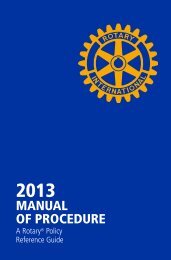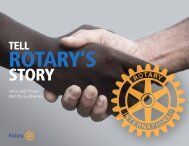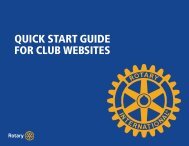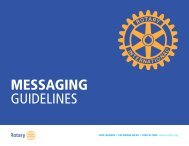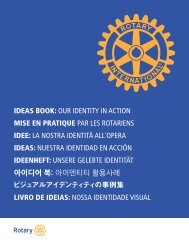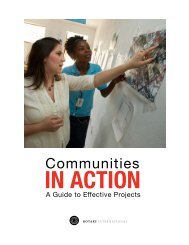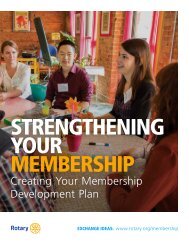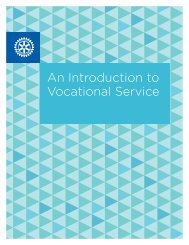Community Assessment Tools
Rotary International a companion piece to communities in action
Rotary International a companion piece to communities in action
You also want an ePaper? Increase the reach of your titles
YUMPU automatically turns print PDFs into web optimized ePapers that Google loves.
8. Panel Discussion<br />
A panel discussion is a guided exchange involving several<br />
experts on a specific subject. Panel discussions are carefully<br />
structured and typically involve a facilitator who asks panelists<br />
specific questions about the community or a particular<br />
issue. Often, city governments, nonprofit or nongovernmental<br />
organizations, hospitals, and universities pay experts to<br />
collect and interpret detailed information about communities<br />
and the issues they face. Drawing on this expertise is an<br />
excellent way to learn about a community without having to<br />
invest a lot of time or money in a new community<br />
assessment.<br />
Before conducting a panel discussion, identify community<br />
members who are qualified to talk about particular issues<br />
and resources. Panels generally have four to six experts on<br />
a particular issue (for example, a discussion on community<br />
health might include a doctor from a local hospital, a health<br />
official from a government health office, a professor from a<br />
local university who researches community health issues, and<br />
a community health care specialist from a local nonprofit or<br />
nongovernmental organization). To get a broader view of the<br />
community, consider facilitating a series of panel discussions<br />
on different issues.<br />
Panel discussions are a powerful tool to raise the awareness of<br />
club members and to quickly learn about service opportunities<br />
from experts.<br />
Carefully consider the discussion questions you’ll pose to the<br />
panel. Make arrangements to record the discussion or have<br />
someone take detailed notes.<br />
Materials<br />
• A table and chairs arranged to face the audience<br />
• Microphones and amplification equipment, if<br />
necessary<br />
• Name tags for each panelist<br />
• Overhead projector or other projection equipment<br />
(optional)<br />
• Seating for audience members<br />
Procedures<br />
1. Introduce the panelists and the discussion topic.<br />
(5 minutes)<br />
2. Ask the prepared questions, giving each panelist an<br />
opportunity to speak. (30 minutes)<br />
3. Open the floor to questions from the audience.<br />
(15-20 minutes)<br />
4. Summarize the discussion, and thank panelists for<br />
their time. (5 minutes)<br />
Variation<br />
Hold expert panel discussions for each of Rotary’s six areas<br />
of focus.<br />
Panel discussion session plan<br />
This session plan for conducting a panel discussion can be<br />
adapted to fit your club’s specific needs.<br />
Objective<br />
Hear what experts have to say about specific community<br />
issues.<br />
Time<br />
1 hour<br />
Preparation<br />
Select the issue your club would like to learn more about,<br />
and identify four to six experts from the community with<br />
specific knowledge or experience related to that issue. Strive<br />
for a balanced panel with people from a variety of backgrounds.<br />
(Keep in mind that expertise isn’t necessarily determined<br />
by someone’s title, education level, or profession.)<br />
Invite the potential panelists to participate, explaining the<br />
purpose of your panel discussion. Ask if they have any handouts<br />
that can be distributed to your club members, and offer<br />
to make copies for all attendees.<br />
<strong>Community</strong> <strong>Assessment</strong> <strong>Tools</strong> 9




